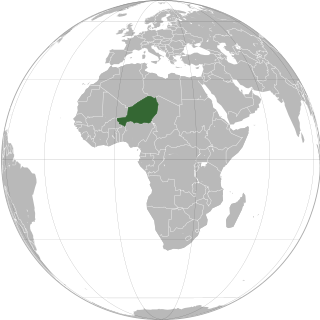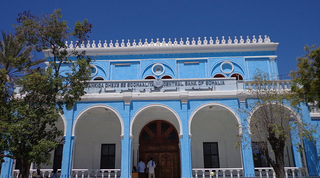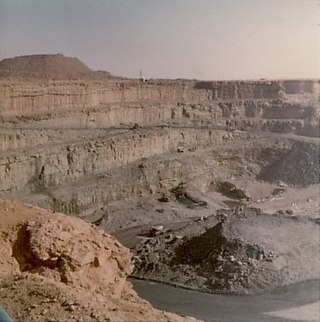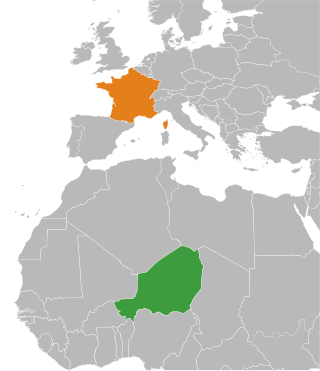
Niger or the Niger, officially the Republic of the Niger, is a landlocked country in West Africa. It is a unitary state bordered by Libya to the northeast, Chad to the east, Nigeria to the south, Benin and Burkina Faso to the southwest, Mali to the west, and Algeria to the northwest. It covers a land area of almost 1,270,000 km2 (490,000 sq mi), making it the largest landlocked country in West Africa. Over 80% of its land area lies in the Sahara. Its predominantly Muslim population of about 25 million lives mostly in clusters in the south and west of the country. The capital Niamey is located in Niger's southwest corner.

The gross domestic product (GDP) of Niger was $16.617 billion US dollars in 2023, according to official data from the World Bank. This data is based largely on internal markets, subsistence agriculture, and the export of raw commodities: foodstuffs to neighbors and raw minerals to world markets. Niger, a landlocked West African nation that straddles the Sahel, has consistently been ranked on the bottom of the Human Development Index, at 0.394 as of 2019. It has a very low per capita income, and ranks among the least developed and most heavily indebted countries in the world, despite having large raw commodities and a relatively stable government and society not currently affected by civil war or terrorism. Economic activity centers on subsistence agriculture, animal husbandry, re-export trade, and export of uranium.

Somalia is classified by the United Nations as a least developed country, with the majority of its population being dependent on agriculture and livestock for their livelihood. The economy of Somalia is $4.918 billion by gross domestic product as of 2020. For 1994, the CIA estimated it at purchasing power parity to be approximately $3.3 billion. In 2001, it was estimated to be $4.1 billion. By 2009, the CIA estimated that it had grown to $5.731 billion, with a projected real growth rate of 2.6%. In 2014, the International Monetary Fund estimated economic activity to have expanded by 3.7% primarily. This expansion was driven by growth in the primary sector and the secondary sector. According to a 2007 British Chambers of Commerce report, the private sector has experienced growth, particularly in the service sector. Unlike the pre-civil war period, when most services and the industrial sector were government-run, there has been substantial, albeit unmeasured, private investment in commercial activities. The investment has been largely financed by the Somali diaspora, and includes trade and marketing, money transfer services, transportation, communications, fishery equipment, airlines, telecommunications, education, health, construction and hotels.

Arlit is an industrial town and capital of the Arlit Department of the Agadez Region of northern-central Niger, built between the Sahara Desert and the eastern edge of the Aïr Mountains. It is 200 kilometers south by road from the border with Algeria. As of 2011, the commune had a total population of 112,432 people.

Agadez Region is one of the seven regions of Niger. At 667,799 square kilometres (257,839 sq mi), it covers more than half of Niger's land area, and is the largest region in the country, as well as the largest African state subdivision. The capital of the department is Agadez.
Orano Cycle, formerly COGEMA and Areva NC, is a French nuclear fuel company. It is the main subsidiary of Orano S.A. It is an industrial group active in all stages of the uranium fuel cycle, including uranium mining, conversion, enrichment, spent fuel reprocessing, and recycling.

Agriculture is the primary economic activity of a majority of Niger's 17 million citizens.
Uranium production is an important part of the African economy, with Niger, Namibia and South Africa creating up to 18% of the world's annual production. Many African countries produce uranium or have untapped uranium ore deposits.

The mineral mining industry is a crucial piece of the Economy of Niger. Exports of minerals consistently account for 40% of exports.

France–Niger relations are the foreign relations between France and Niger. Their relations are based on a long shared history and the more than sixty year rule of Niger by the French colonial empire, beginning with the French conquest in 1898. Niger obtained independence from France in 1960, and a history of French influenced culture and French language have been a point of commonality in the creation of a distinctive Nigerien culture from the diverse pre-colonial nationalities which make up modern Niger. France benefited economically from their time as a colonial power, and still relies on imports from Niger for elements of their economy.

SOMAIR is a national mining company of Niger in the mining area of its northern zone. Established in 1968, it started uranium mining at the Arlit deposit in 1971, mining 0.30 - 0.35% ore down to depth of 60 metres (200 ft) depth. By 1981, the company was producing 2100 tU/yr and by 2006 it was producing 1565 tU at the Tamou deposit. The production peaked to 3065 tU in 2012. The resources, according to the Red Book, are assessed at 23,170 tU, as of 2010, at 42,200 tU of 0.25%U grade recoverable conventionally, and 5500 tU of 0.07%U grade from heap leaching. SOMAIR is one of two national mining companies in Niger, the other being COMINAK in the nearby Akokan.
COMINAK is a national uranium mining company of Niger.
Akokan is a mining town in the Arlit Department of the Agadez Region of northern-central Niger. It is located about 5 kilometres (3.1 mi) southwest of Arlit in the Sahara Desert, and roughly 250 kilometres (160 mi) north of Agadez. It is considered to be Niger's "second uranium town". SOMAIR and COMINAK, run by Areva and the Nigerien state, operate uranium mines in the vicinity of the towns of Akokan and Arlit. In the maps of the area, Akokan is classified under "Mine - Agadez-Niger". The Tuareg and Toubou people are local to the area.

Tanzania is a land rich in minerals. Mining makes up more than 50% of the country's total exports, of which a large part comes from gold. The country has gold reserves of 10 million ounces, generating revenue of over a billion USD. Diamonds are also found in significant amounts. Since it was opened in 1940, the Williamson diamond mine has produced 19 million carats (3,800 kg) of diamonds. Gemstones, nickel, copper, uranium, kaolin, titanium, cobalt and platinum are also mined in Tanzania. Illegal mining and corruption are ongoing problems. In 2017, the government passed a series of bills aimed at increasing revenue from minerals after a scandal which caused the dismissal of the Minister for Energy and Minerals.













